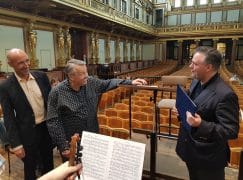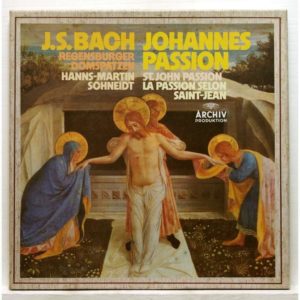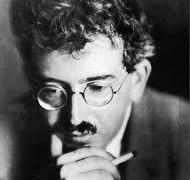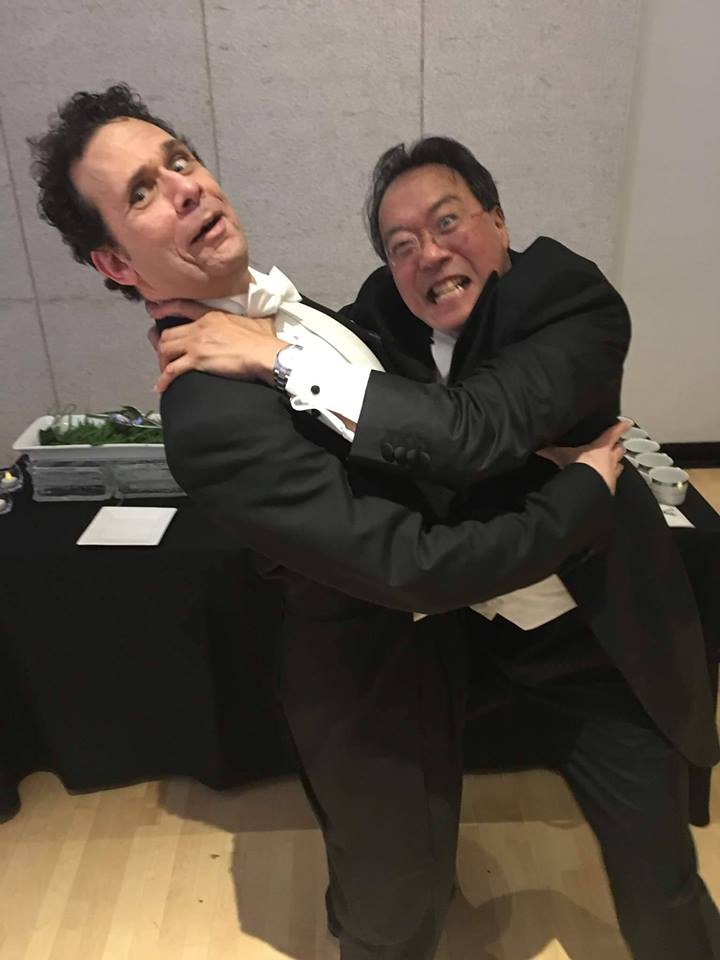Chin-Chao Lin has been named Generalmusikdirektor at Theater Regensburg.
Lin, 31, has been Kapellmeister until now in Meingingen.
This is a big step up.

Chin-Chao Lin has been named Generalmusikdirektor at Theater Regensburg.
Lin, 31, has been Kapellmeister until now in Meingingen.
This is a big step up.

Message received:
Vienna – Maestro Mariss Jansons has been awarded Honorary Membership in the Vienna Philharmonic. The orchestra’s chairman, Daniel Froschauer, presented the award on Tuesday, June 5, during rehearsals for upcoming concerts in the Musikverein. “It has been my honor to conduct this orchestra many times. These encounters always provide me with a feeling of musical happiness and an unforgettable experience. I am very pleased to receive this honorary membership”, said Jansons.
The Latvian conductor conducted the Vienna Philharmonic for the first time in April 1992. Since that time, Mariss Jansons has conducted the Vienna Philharmonic on 110 occasions, including three New Year’s Concerts in the years 2006, 2012 and 2016.

Juan Diego Flórez has pulled out of Vienna’s Rigoletto on June 7 and 10.
Saving his voice for the Putin football fest?

Florez is replaced as the Duke by the Sicilian tenor, Ivan Magrì, making his house debut.
Also out is Ryan Speedo Green. His sub as Sparafucile is Jongmin Park.
The death has been reported of Hanns-Martin Schneidt, successor to Karl Richter as head of the Munich Bach Choir, which he led from 1984 to 2001.
Schneidt was previously music director in Wuppertal from 1963 and, like Richter before him, he would be called to conduct Christmas and Easter concerts with the Berlin Philharmonic, Munich Philharmonic and Berlin radio orchestras.
He rests with angels.

Tony Hall’s decision today to sell off the BBC’s historic Maida Vale studios has all the hallmarks of fudge.
The studios occupy one side of a street in one of London’s most expensive residential areas. The time to sell would have been 5-10 years ago, during a property boom when developers would have paid a fortune for the site.
Now, with top-end property prices frozen and Brexit heaving with uncertainty, the BBC will get a fraction of that price and it still has not solve the main problem: what’s to be done with the BBC orchestras that rehearse and record in Mada Vale?
In truth, the orhestras haven’t needed the building for a decade. Since the collapse of commercial recording, London has plenty of rehearsal space to rent – and at a far lower premium than the per-foot cost of Maida Vale.
But the BBC could not make up its collective mind about Maida Vale and Lord Hall is among the worst of its ditherers.
He is now talking of building a big complex for the orchestras in East London. But who needs that? And when will the BBC reach a decision on what exactly is the purpose of its London orchestras?
Dither, dither, and Tony Fudge.

Some reflections from period ensemble maestro Joel Cohen:
As my Twitter feed erupts into a chorus of groans and moans about a newly handed-down Supreme Court decision, I find myself thinking distinctly minority, and surely unpopular thoughts, at least as regards those tweets coming from the left, which I consider my
political/ideological home. (My musical home is with Mozart, and Billie Holiday, just in case you are curious).
Putting Mozart and Billie aside, this was, as we most all know by now, the case of the Colorado artisan-baker who refused, on religious grounds, to custom-design and bake a wedding cake for a gay couple. As I understand the story, he offered to sell them a ready-made cake; it was the idea of creating a special one that provoked his demurral.
Most of the comments I read online this afternoon considers the ruling, though on narrow grounds, as a sort of victory for the right, and for the religiously bigoted, and as a gay-rights issue, incorrectly decided. So why do I think that such a view is wrong? Why do I think that the baker, narrow minded as he may be, needed to be protected in his refusal to act?
It has to do with my profound belief, not, as it would appear, so widely shared on the left side of the Twittersphere, that
a. custom designing a cake is an act of artistic creation/expression, and that
b. artistic expression is a form of speech, and that freedom of speech is constitutionally protected under
our system, and that nothing in the American system means anything without that bedrock protection.
In support of my view, I would like to tell a parable, lightly fictionalized, loosely based on an actual event that took place some years back in a community not unlike our own. Once upon a time, in the city of Fèveville, the Beantown Baroque, a correctly-pitched-at-415 chamber orchestra, decided to give a performance of Bach’s St. John Passion, transcendental choruses, antisemitic bits, and all. It was a big deal. Primo Posner, the gifted concertmaster, and a most scrupulous scholar/performer, read the entire Gospel narration just before rehearsals began, and discovered that his idol, J.S. Bach, had willingly set some passages that cast the Jewish people, his people, in a most unfriendly light, imputing to them a collective guilt for the death of mankind’s Savior. Primo was shocked, upset and conflicted. He passed a nearly-sleepless night, trying to decide what to do.
Did Primo then resign from the first chair, refusing to perform such a flawed masterpiece? It would have been easier for my parable had he done so, but instead (and how wonderfully Jewish) he wrote an anguished essay about the issue, seeing to it that the Beantown concertgoers had a chance to receive an offprint of his thoughts prior to entering the hall and attending the concert. They could then read the essay, and get all conflicted themselves about the pleasure they were deriving from the sublime music.
I compare Primo Posner, nonetheless, to the no-can-do baker in Colorado. Both are artisans in the world of the arts, and both are conscious, as we all should be, of a moral/spiritual underpinning to the work they do. Maybe, like Primo, the baker should have accepted the commission, and then written a dissenting essay.
But in any case one cannot, in my view, coerce artistic expression from someone who believes that his or her moral or ethical principles are being violated. Defending the integrity of the arts and of artists is not, seemingly, at the top of most peoples’ priority list these days. But it should be, along with many other grave issues that are more clearly played out in the news of the day.

Your thoughts?
The German-Jewish philologist and philosopher who committed suicide at Port-Bou on the Franco-Spanish border in September 1940 is the hero of a new opera, Benjamin, which has just opened at Hamburg.
Peter Ruzicka’s work is by no means the first on the subject.
Two years ago, the philosopher Régis Dubray and composer Michel Tabachnik presented Benjamin, Dernière Nuit in Lyon. It sank without trace.
The British composer Brian Ferneyhough created Shadowtime in 2005 on the same theme, and the same outcome.
And Elliott Sharp put on a Benjamin opera in 2014 in Brooklyn. It stayed in Brooklyn, apparently.
It’s hard to fathom the connection between Benjamin’s lexical precision and the excesses of opera, let alone the contrast between his essentially dull life and the requirements of drama.
But composers just keep trying.
Has anyone seen the new Ruzicka yet?

This piece of pre-audition advice by Brinton Smith, principal cello of the Houston Symphony, is going viral on musician networks (the picture is unrelated).

We start three days of cello auditions today. I have more students and friends taking part in the process than I care to think about. The audition process is not designed to advance the best musicians or even the best instrumentalists. At its best, it only advances the people who played the best audition, at that particular moment, with that particular repertoire.
This is not sports. Having to order different musicians with different strengths and weaknesses numerically is like being asked to rank a bowl of fruit. Choosing a new colleague this way is like choosing a spouse through an evening of 2 minute speed dates, while wearing a blindfold.
It is the worst system except for all the others, and it is painful and somewhat soul crushing to take part in it on either side. It is inevitable that some great, qualified cellists who have invested their hours, their money and their souls to play for us will be sent home discouraged and unhappy.
It takes incredible bravery to take part in this system, and every player who does has my respect and gratitude. Remember the words of Kipling- triumph and disaster are both imposters. We need jobs of course, and have to do what it takes until we find one, but we didn’t go into music to find a job, we went into music because of what it means to us and in the world. Guard and protect that belief and that passion, remember why you play, and never stop learning or trying to improve, even if you win.
Many musicians are destroyed by success, but no one is destroyed by failure. If there’s any lesson to my own career it’s that every failure is temporary. Play without regrets and play music- we are rooting for you.